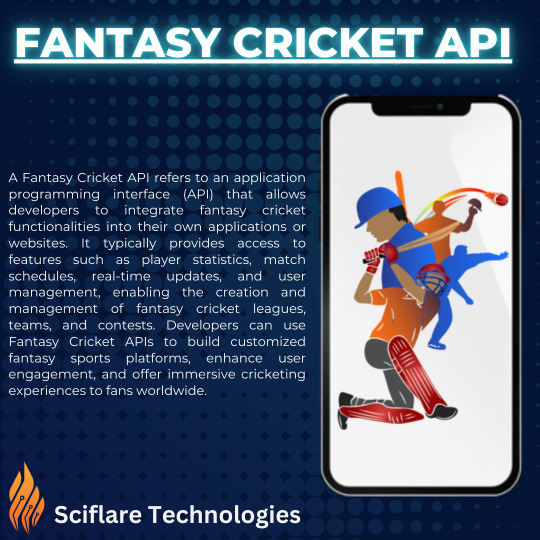Don't wanna be here? Send us removal request.
Text
Hire Manual QA Tester for Flawless Software Quality
Looking to hire manual QA testers to ensure a bug-free and seamless user experience? Sciflare is the best choice! Our expert manual QA testers meticulously test applications, identifying even the smallest defects that automation might miss. We follow structured testing methodologies, ensuring your software meets the highest quality standards before launch.
At Sciflare, we specialize in functional, usability, regression, and exploratory testing, helping businesses deliver reliable products. Hire manual QA testers today and enhance your software’s performance with precision and expertise!
0 notes
Text
Definition for react native mobile development?
React Native Mobile Development is a framework for building cross-platform mobile applications using JavaScript and React. It enables developers to create native-like apps for both iOS and Android from a single codebase, offering high performance and a smooth user experience.
0 notes
Text

Fantasy Cricket App Development involves creating engaging, user-friendly platforms where cricket fans can build teams, track real-time scores, and compete in virtual leagues. Key elements include a sleek design, real-time data integration, robust security, and customization options, ensuring an exciting and fair experience for users.
0 notes
Text

A fantasy sports developer specializes in creating and maintaining platforms for fantasy sports games. This role involves designing user-friendly interfaces, integrating real-time data, and implementing scoring systems and customization options. A fantasy sports developer ensures a seamless, engaging user experience by focusing on mobile optimization, data security, and compliance with legal regulations. Their work supports the growing popularity of fantasy sports by delivering innovative and interactive experiences for players.
0 notes
Text

Flutter application development involves creating mobile, web, and desktop applications using the Flutter framework, which is developed by Google. Flutter allows developers to build natively compiled applications from a single codebase, using the Dart programming language. It features a rich set of pre-designed widgets and tools, enabling the development of high-performance, visually appealing applications with a consistent user experience across different platforms. The framework's hot reload feature also allows for rapid iteration and testing, making it an efficient choice for modern app development.
0 notes
Text

React Native mobile development empowers developers to build high-quality, cross-platform mobile apps using a single codebase. By leveraging React Native, developers can create native-like experiences for both iOS and Android efficiently, combining the benefits of web development with powerful mobile capabilities.
0 notes
Text
#Fantasy Premier League App Development#Premier League App Development#Football Premier League App Development
0 notes
Text
Monetization Strategies for Your White Label Fantasy Sports Software
Introduction:
Millions of fans worldwide are involved in numerous leagues and contests within the rapidly expanding fantasy sports sector in recent years. A profitable potential for business owners hoping to cash in on this trend is to provide white label fantasy sports software. But to succeed in this cutthroat industry, you need more than just good software—you also need smart monetization plans.
Important Techniques for Monetization:
1. Models of Subscriptions: Using subscription-based pricing is a popular method to get users to pay you on a regular basis. Provide a range of subscription packages with distinct perks, including access to premium leagues, sophisticated analytics, or unique content. In addition to offering a reliable source of cash, this entices consumers to upgrade for better features.
2. Advertising Revenue: You can make a lot of money by utilizing the advertising space on your white label fantasy sports platform. Display advertisements from local businesses trying to attract sports fans, or from relevant sports brands and product companies. Sponsored content and native advertising can also be successful revenue streams without compromising user experience.
3. Commission on Transactions: Charging a tiny commission on each transaction, such as the purchase of virtual products like personalized avatars or team logos, or the payment of entry fees for premium leagues, can result in a sizable cash stream over time for your platform. To keep users' trust, make sure that fee structures are transparent.
4. Partnerships and Sponsorships: To market your white label fantasy sports software, establish strategic alliances with media organizations, sports teams, and leagues. In exchange for brand awareness on your platform, sponsorship agreements might offer up-front funding and continuing marketing. To strengthen these collaborations even more, think about providing co-branded leagues or competitions.
5. In-App Purchases: Enable users to purchase virtual products or premium features by integrating microtransactions into your platform. This might be early access to new features, customized analytics, or unique player stats. Freemium business strategies, in which more advanced features are paid for but basic services remain free, might draw in a larger user base.
6. Data Licensing: Data and statistics are essential to fantasy sports. Think about granting media businesses, sports commentators, or outside developers a license to use the data on your site. This could be a valuable source of additional income, particularly if your platform produces in-demand, distinctive insights or data.
Increasing User Attraction and Retention
As critical as it is to put these monetization ideas into practice, it is just as important to keep user engagement and retention strong. The following advice can help improve user experience:
Gamification: To make the fantasy sports experience more engaging and competitive, include gamification components like leaderboards, achievements, and badges.
Social Integration: Make social features available so that people can use social media platforms to share their teams, successes, and insights. This increases interaction and gives your platform free advertising.
Responsive Customer Support: Respond quickly and efficiently to user questions, technical problems, or comments. Content consumers are more likely to stick with your platform and refer others to it.
Regular Updates: Keep up with the competition by adding new features, enhancements, and seasonal material to your white label fantasy sports software on a regular basis. This will keep customers interested all year long.
In summary:
Careful preparation and execution are necessary for the launch and profitability of a white label fantasy sports software. Through the integration of intelligent monetization techniques, strong software, and an emphasis on user interaction, entrepreneurs may capitalize on the rapidly expanding fantasy sports industry and establish a long-lasting enterprise. Whether it's through partnerships, in-app purchases, advertising, or subscriptions, the secret is to give users something of value while making money. To secure long-term success in this fast-paced business, embrace innovation, remain receptive to consumer feedback, and modify your ideas as the market changes.
0 notes
Text

Fantasy Cricket API
0 notes
Text

This is why Sciflare is best
End-to-End Support: They appear to offer a comprehensive service, guiding clients through the initial concept to app launch and beyond. Sciflare Technologies is a top fantasy sports developer.
Focus on User Experience: They emphasize the need of building intuitive and engaging user interfaces, which are critical for the success of any mobile application.
1 note
·
View note